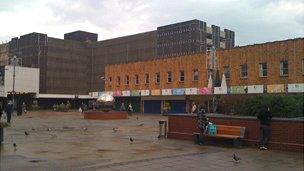Newport and Swansea economies falling behind other UK cities, claims report
- Published

Newport city centre redevelopment has been delayed by the downturn
Newport and Swansea are falling behind other UK cities, according to a report on economic performance.
Research group Centre for Cities said areas with less dynamic private sectors would struggle to handle public sector cuts and a weak national economy.
The report warns against implementing a "one-size-fits-all" economic policy.
Dr Jonathan Deacon of the Newport Business School said the city was hampered by its historical reliance on public sector employment.
He called for enterprise zones to be based on regions rather than cities.
The annual report by Centre for Cities, external, a policy and research charity, assesses the economic health of 64 cities across the UK.
Skills and innovation
It said cities that performed well, such as Edinburgh, Cambridge and London, all had strong private sectors, and high numbers of skilled residents and "knowledge workers" - those who work in professions such as law, accountancy and finance.
The report highlights Milton Keynes and Aberdeen as well placed to drive the national economic recovery as they had seen a large number of business start-ups and were highly innovative, with significant numbers of patents registered.
Newport and Swansea were named alongside Doncaster, Hull and Sunderland as the cities most likely to be vulnerable to rises in unemployment in 2012, due in part to smaller numbers of knowledge workers, lower qualifications and a reliance on public sector employment.
"The gap between cities is widening," said Alexandra Jones, chief executive of Centre for Cities.
"This makes it vital that government policy is tailored to meet the needs of each city rather than one-size-fits-all."
Dr Jonathan Deacon, of the Newport Business School, told BBC Radio Wales that the city was suffering from a historical reliance on public sector employment, as the home of major UK government agencies such as the passport, statistics and patent offices.
He said Newport was also being squeezed by the advantages of neighbouring cities such as Cardiff and Bristol, which were also set to benefit from the creation of enterprise zones.
"We are in Newport really sandwiched by that problem of our neighbouring cities having perhaps a more advantageous proposition than we have," he said.
"We shouldn't really look at identifying cities as enterprise zones but more regions, because that makes more sense in a country the size of Wales, and a country the size of the UK."
'Eager workforce'
Harri Lloyd Davies, an accountant who sits on the west Wales committee of the South Wales Chamber of Commerce, said the report painted a much too negative picture of Swansea.
He told BBC Radio Wales that figures relating to the number of business start-ups gave no indication of how many survived, and that a city with a large pool of redundant public sector workers could prove attractive to private companies.
"The reality on the ground is that there are a lot of businesses out there that are having a very successful time at the moment growing in the size of their turnover and profits," he said.
"There's no doubt that Swansea has got more reliance (on the public sector) than other parts of the UK but that's not to say it can't turn it round and become far more successful going forward.
"One of the advantages of having a large number of people who aren't working at the moment is that if you want to start up a business in Swansea you have a huge and very eager workforce ready to work for you."
- Published23 January 2012
- Published13 December 2011
- Published12 November 2011